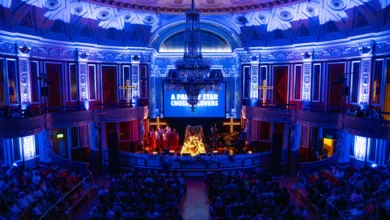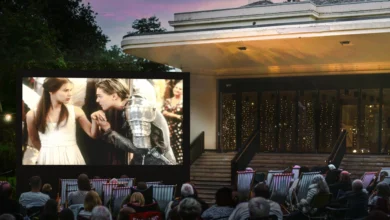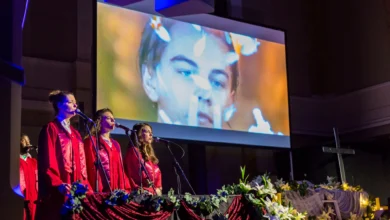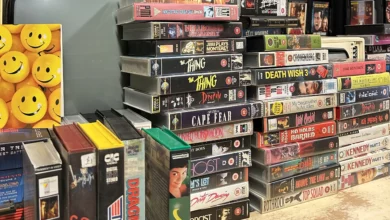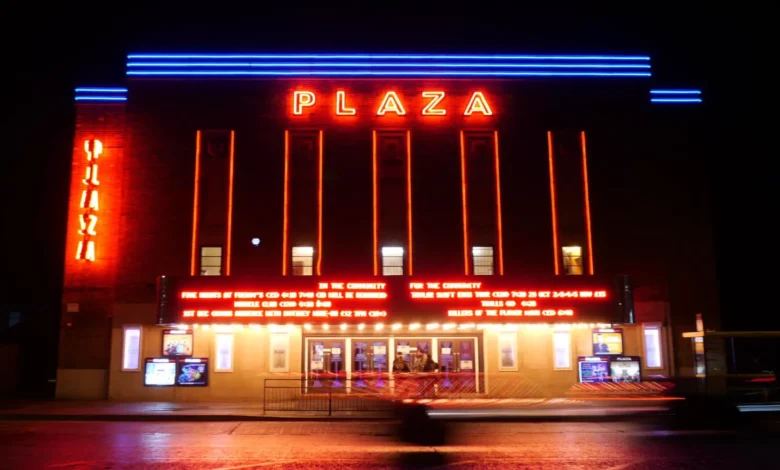
Independent Cinemas In Liverpool You Must Visit
The world of arthouse film finds itself a home in the lively, vibrant and magnetic city of Liverpool and its finest independent cinemas. Screening a range of foreign, indie and niche titles, as well as current and blockbuster films to old-time hits and cult classics, Liverpool’s schedule for arthouse film is bustling.
Picturehouse at FACT
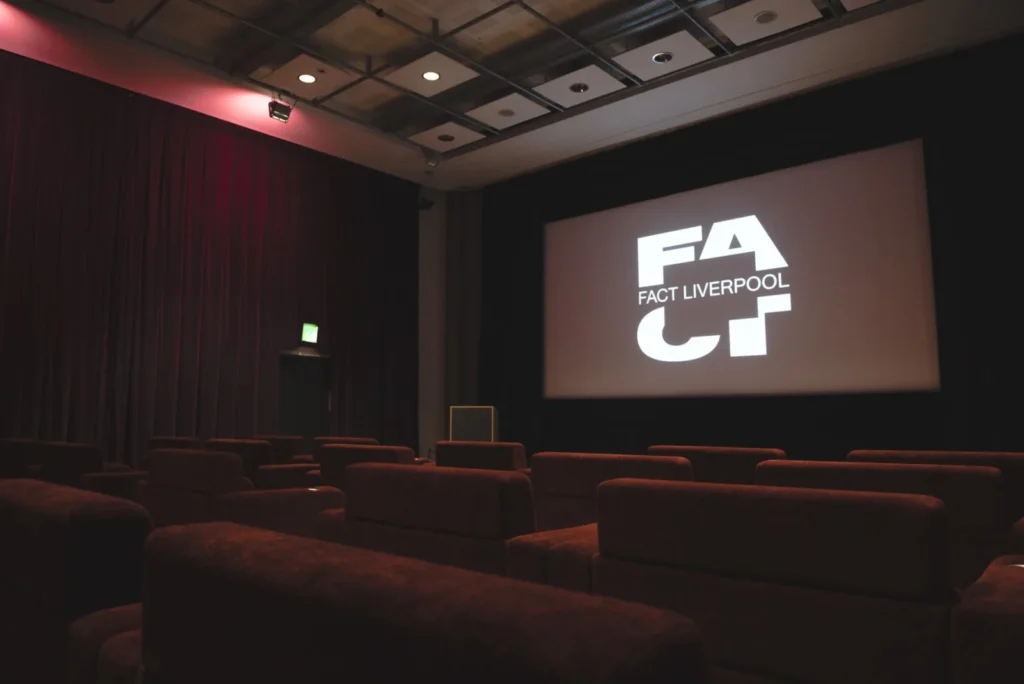
In 1988, FACT (Foundation for Art and Creative Technology) started out its presence in Liverpool under a different name – Merseyside Moviola. This project was run by two Liverpool University students, Josie Barnard and Lisa Haskel (who were later assisted by Everyman Theatre employee, Eddie Berg) who recycled a disused chapel in order to occasionally screen local artists’ films and videos. Just one year later in 1989, as Barnard and Haskel graduated and moved on, Berg re-named the organisation Moviola and launched Video Positive, an international festival of video-art (focusing on installation-based work) held in the UK. Video Positive was successful enough to become a biennial event, which introduced several upcoming artists at the time, including – Tony Oursler, Mark Wallinger and Isaac Julien – to a UK audience. In 1993, Moviola began its 10-year process of raising enough funds to create a cultural centre dedicated to film, new media and art in Merseyside.
Fulfilling this goal, in 2003, Moviola transformed into FACT. FACT was the catalyst for the regeneration of Merseyside – earning itself the title of Liverpool’s first new arts building in over sixty years. The organisation had moved on from the semi-derelict chapel, to a £10 million award-winning landmark building. Artists, such as Isaac Julien, praised the centre by leaving glowing reviews – “This is a gallery that allows digital artists to think like film-makers and have their ambitions realised in a professional environment”. With an overwhelmingly positive response like this for the organisation’s art-related ventures, not only did FACT quickly become the UK’s leading media arts centre, it also broadened its horizons into the world of film – with the addition of the Picturehouse.
Picturehouse at FACT is a central feature of the organisation, offering up four state-of-the-art auditoria, stadium seating, THX-standard sound, 70mm of digital projection and 35mm of standard projection, as well as a café and bar. The diverse film programming showcases first-rate independent, art-house, foreign-language and mainstream cinema, from all around the globe. Not only does the Picturehouse cover all bases in terms of film genres, it also caters to all different kinds of audiences in terms of environment. With its autism-friendly, ‘Watch with Baby’, ‘Kids’ Club’, ‘Toddler Time’ and dementia-friendly screenings, Picturehouse really is a place for everyone to enjoy cinema. The trailblazing, modern and versatile centre also hires out its venue for private events and conferences.
FACT Liverpool: 88 Wood Street, Liverpool, L1 4DQ
Everyman Cinema
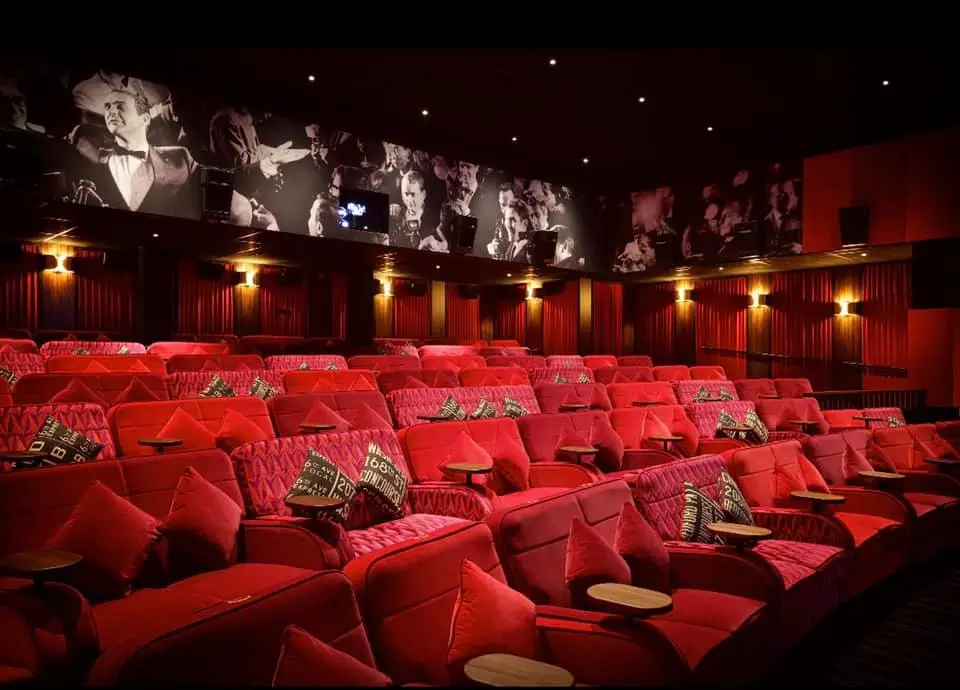
The deeply rich history of the Everyman actually begins in the Camden borough of London, in Hampstead, and dates all the way back to the 1920s. Originally, the venue was famously known as the Everyman Theatre. Until 1933, when solicitor, James Fairfax Jones, and his wife, Tess, re-opened the venue as the UK’s first repertory cinema (still under the name of the Everyman). Their aim was to show mostly revival films, from all around the world. Despite the obstacles they faced in the beginning, they made a success out of the small, 285-seated, cinema. Tess would run regular art exhibitions in the foyer, featuring the work of local artists. They would show films in repeated ‘seasons’, with each ‘season’ showcasing films from the same directors and stars – the first Marx brothers season in 1936 was a pioneering moment for the cinema and became a distinctive part of its appeal, so much so it was repeated in 1937, 1938 and 1939.
However, as World War II took its toll on the globe, the Everyman was forced to close in September 1940. The Fairfax Jones couple re-opened in February of 1946, when they could import films from abroad again – Orson Welles’ Citizen Kane (1941) proved to be the most popular, playing repeatedly in 1946 and beyond. In 1954, the married couple carried out their big plans and aspirations for their venue, as they installed a new wide screen projection cinemascope and refurbished the foyer gallery. After James’ tragic death, ownership of the Everyman moved over to the family trust. In 1998, it was taken over by a small chain named Pullman Cinemas, who invested £800,000 in its refurbishment. Yet, after continuous heavy losses, Pullman put the cinema on the market only a year later. It wasn’t until 2000, when it was bought by a young property entrepreneur (Daniel Broch), that the venue became the first of the now leading independent UK cinema group – the Everyman Cinema Group. Now successfully running 38 ‘boutique’/’lifestyle’ venues, the Everyman redefines the notion of cinema.
Priding themselves on their innovative approach to the cinema-going process, the Everyman provides the choice of ordering soft drinks or alcohol, as well as freshly made hot food, straight to your seat during screenings. Their unique film programming features a varied selection of independent, classic and mainstream titles. The difference with their screenings, however, is some are part of special events, launches and some are even live satellite broadcasts! Their curated event programme includes live Q&A sessions, film festival screenings, big-screen music experiences, previews, pop-ups, screening parties, live broadcast theatre, opera and ballet.
Everyman Cinema: 35 Whitechapel, Liverpool, L1 6DA
Plaza Community Cinema
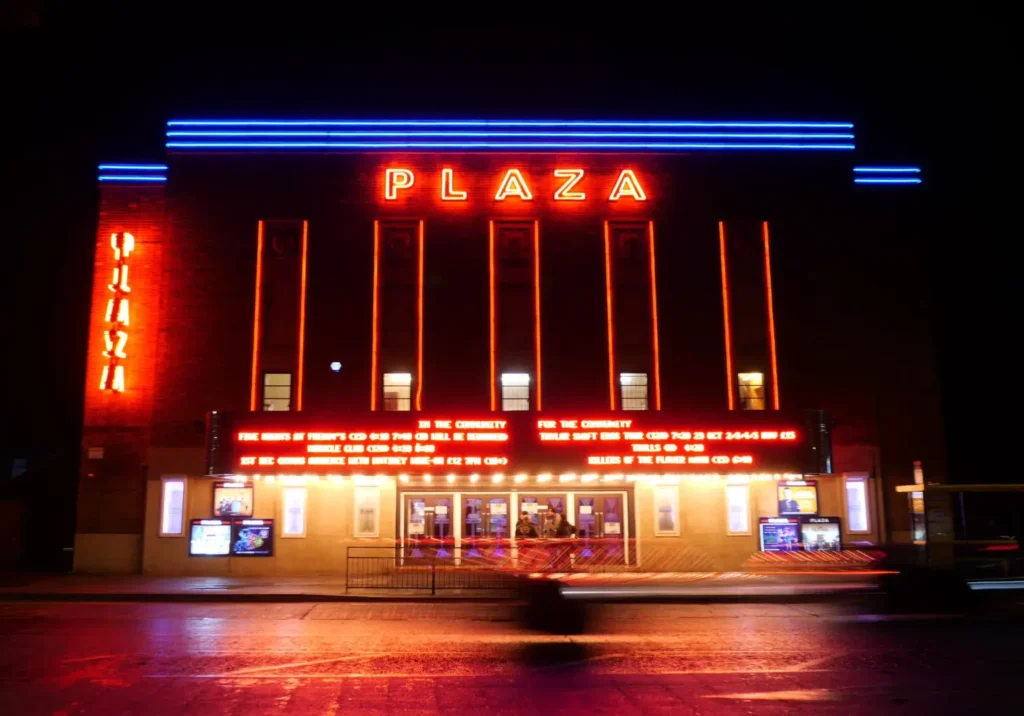
The Plaza Cinema opened its doors on 2 September 1939 – an event that made history by being the only cinema to open and close on the same day due to the outbreak of the second World War! Two weeks later, the venue re-opened, offering not only full film programming but also live variety entertainment performances from famous artists including – Tommy Handley, Arthur Askey, Charlie Chester, Ted Ray and Hilda Baker. In 1976, the cinema was refurbished, providing the venue with three screen rooms and 667 seats in total. Despite the cinema’s success, its future was put under threat in October 1995, when a planning notice was stuck to the lamppost outside by a developer who wanted to turn the venue into a group of offices. This spurred a local schoolboy on to campaign to save the cinema.
The determination of this young boy then inspired a group of dedicated women to join forces and make a collaborative effort to save and improve their local cinema for their whole community. Together they formed a committee which raised awareness of the situation, resulting in a 10,000-signature petition which caused the developer to withdraw his proposal leaving the site available to the open market. Through hard work and perseverance, as well as an abundance of voluntary support, the venue was leased by a registered charity called Plaza Community Cinema – with its grand re-opening happening on 18 July 1997.
Since this date, the three-screen cinema has been run by a group of volunteers and has endorsed a variety of commercial, limited release and foreign-language films, as well as the cult-classics. The Plaza Community Cinema represents a unique blend of dynamic film scheduling and film-based education programmes to schools, the voluntary sector and the general public. Its pioneering array of community events are crafted in order to promote the social, educational and inspirational value of film. As well as this, the cinema also gives spaces for autism and dementia friendly screenings. This makes the cinema one of the few charities in the UK to offer important community facilities and encourage social inclusion through the world of film.
Plaza Community Cinema: 13 Crosby Road North, Waterloo, Liverpool, L22 0LD
Nordic Film Liverpool

Gustav Adolfs Church (based on the original church in Stockholm, Sweden), commonly known as the Nordic Church, has a long history tied to the Liverpool International Nordic Community, which started in 1870. Their initial charity mission was of a religious nature, providing Scandinavian sailors who were emigrating to a number of overseas destinations in the late nineteenth century, with a place of worship and sanctuary – a home away from home. As the number of emigrants grew, the community realised they needed a bigger venue – which is what young architect, William Douglas Caroe, was commissioned with designing in the early 1880s. Caroe designed a unique church, with several Scandinavian architectural features, including stepped gables and a concave lead-covered spire over the entrance – these installations, among others, amounted to a cost of around £15,000. The church is still standing in Liverpool today, very close to the Canning Dock area of the waterfront, as one of only four octagonal churches in the UK.
Nowadays, the church is not only home to the Liverpool International Nordic Community, it also offers up a space for the independent cinema – Nordic Film Liverpool – to showcase the finest contemporary Nordic film. Each title begins at 7:45pm, but before each one there is always the opportunity to sample a selection of Scandinavian snacks and drinks with the proceeds benefitting the Liverpool International Nordic Community charity.
Similar to Woolton Picture House, Nordic Film Liverpool is also a repertory cinema that runs ‘seasons’ of films, one Monday per month. The current season began on 11 September 2023 and is running until 13 May 2024, showcasing one film from Iceland and two films from Denmark, Finland, Norway and Sweden. It aims to pay homage to Swedish film director and screenwriter, Ingmar Bergman, who died in July 2007. Hence, the opening titles for the season were, Bergman Island (2021) and Gycklarnas Afton (1953), which translates into English as Sawdust and Tinsel. All films are shown in colour, aside from black and white classic and all are shown with English subtitles.
The upcoming and final films being shown as part of the current season are, 2 Yota Aamuun (2015) from Finland on 15 April 2024, which translates as 2 Nights Till Morning and Syk Pike (2022) from Norway on 13 May 2024, which means Sick of Myself.
Nordic Film Liverpool: Gustav Adolfs Church, 138 Park Lane, Liverpool, L1 8HG
Honourable Mention: Woolton Picture House
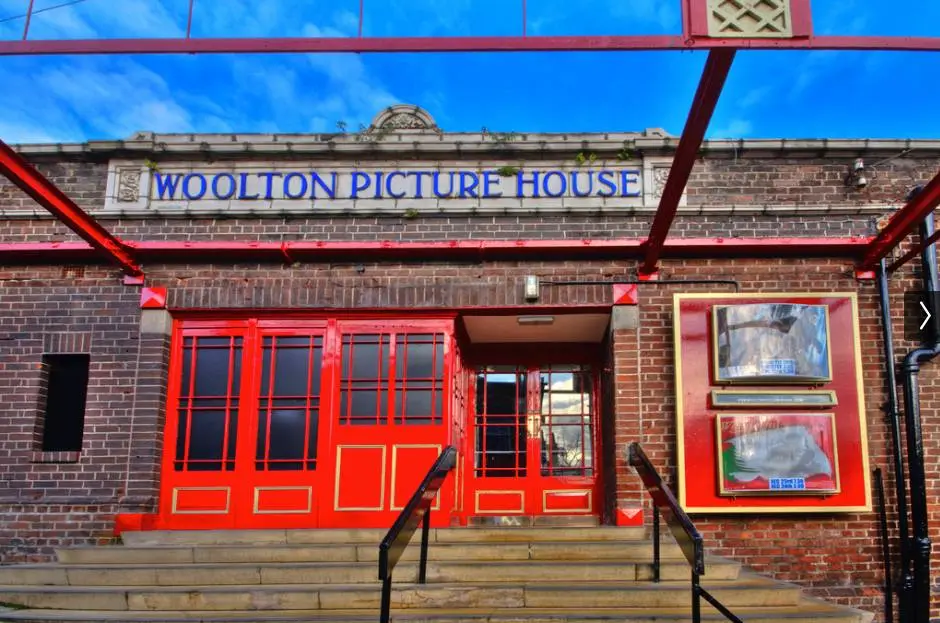
Unfortunately, Woolton Picture House has been closed for a while. However, the historic venue has reassured its loyal customers, that its red doors will re-open soon.
Woolton Picture House is abundant in its history. The beginnings of the cinema started in 1926, when it was designed by well-known architect, L.A.G. Prichard, for Alfred Adams who formed the Woolton Picture House Co. Ltd. in order to operate the cinema. Its doors opened in 1927, with a seating capacity of just over 800 (originally wooden benches). The cinema remained open throughout World War II, as it survived the many bombing raids. There was a shift in ownership by 1954, when the cinema was taken over by Robert Godfrey of Cheshire County Cinemas. Unfortunately, the onset of a fire in the cinema’s screening room led to its 3-month closure in 1958. Just over two decades later, the extensive restorations and refurbishments were finished and in 1980, Woolton Picture House was re-opened – showing off its lavish rows of white steel slats, new canopy, illuminated signs, wall-to-wall screen proscenium, carpeting and 265 luxury Pullman seats. Further closures and re-ownerships occurred throughout the late 1990s and early 2000s.
Woolton Picture House gained more and more recognition as the years went on. It was voted within the Guardian’s Top 20 Best Film Venues in Britain(and named Britain’s “art deco gem”) in 2009, it hosted the film premiere of Indian romance/drama, Madrasapattinam (2010), with film stars attending the cinema’s red-carpet event in 2010 and the next achievement it secured itself was for Trip Advisor’s Certificate of Excellence in 2015. A year later, the cinema was featured in Liverpool Museum’s exhibition – Reel Stories: Liverpool and the Silver Screen – which celebrated Liverpool’s starring role in films from the last sixty years. Finally, 2017 sparked the moment when Woolton Picture House joined ‘Independent – Liverpool’, an organisation that promotes independent businesses from all across the city.
Unfortunately, the cinema’s future seems to be unclear at the moment. The last known owner was John Carmichael who was appointed as director in November 2021. His ownership seems to have lasted until 2022, when the venue closed. The picture house hasn’t been able to shed light on when it will re-open, but assures its customers that it will, soon. However, this uncertainty does not take away from its deep-rooted and copious history as Liverpool’s oldest independent cinema.
Woolton Picture House: 3 Mason Street, Woolton, Liverpool, L25 5JH




